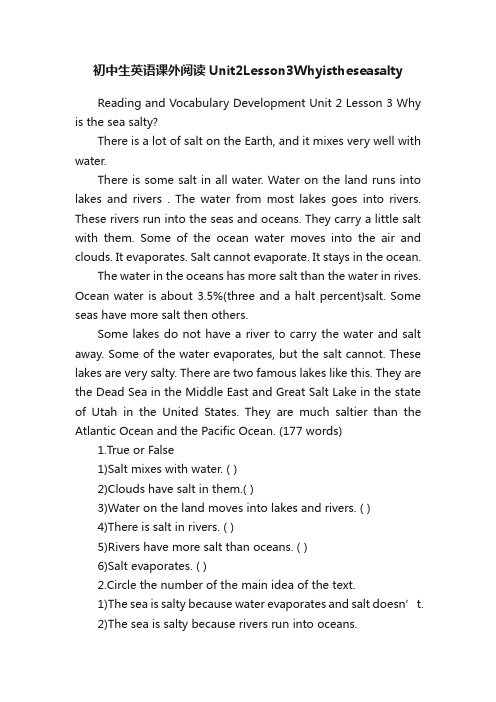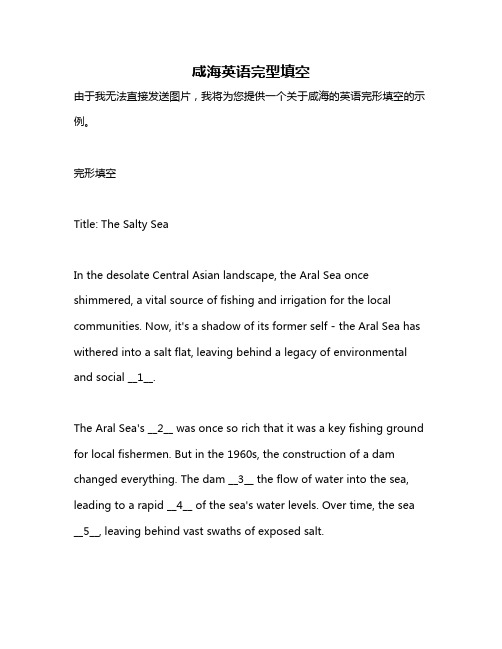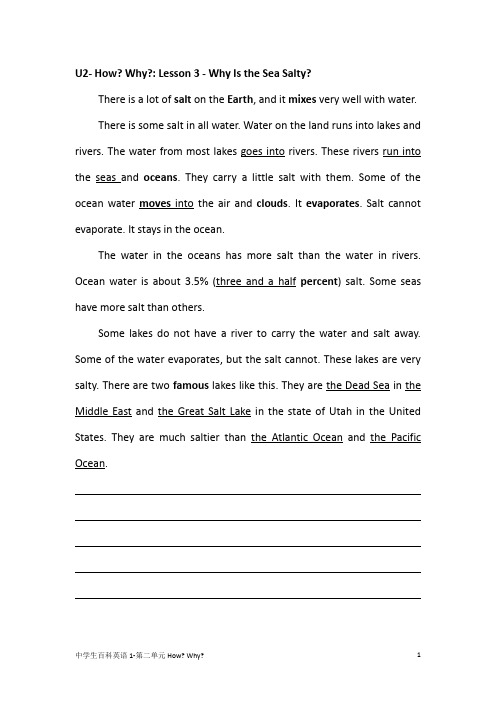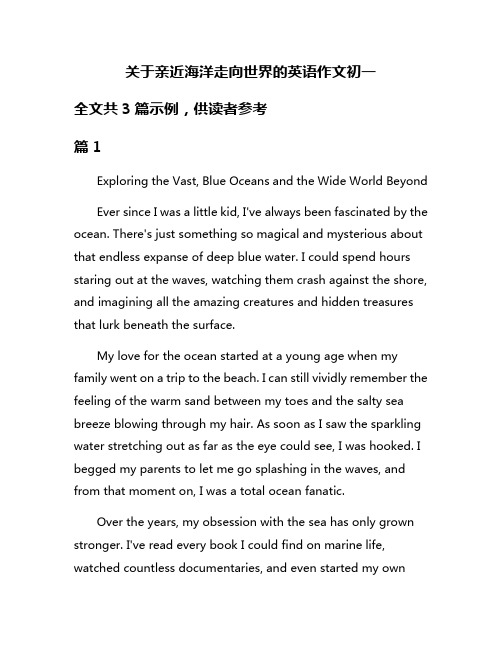初中英语课外阅读拓展 Salty Sea
初中生英语课外阅读Unit2Lesson3Whyistheseasalty

初中生英语课外阅读Unit2Lesson3WhyistheseasaltyReading and Vocabulary Development Unit 2 Lesson 3 Why is the sea salty?There is a lot of salt on the Earth, and it mixes very well with water.There is some salt in all water. Water on the land runs into lakes and rivers . The water from most lakes goes into rivers. These rivers run into the seas and oceans. They carry a little salt with them. Some of the ocean water moves into the air and clouds. It evaporates. Salt cannot evaporate. It stays in the ocean.The water in the oceans has more salt than the water in rives. Ocean water is about 3.5%(three and a halt percent)salt. Some seas have more salt then others.Some lakes do not have a river to carry the water and salt away. Some of the water evaporates, but the salt cannot. These lakes are very salty. There are two famous lakes like this. They are the Dead Sea in the Middle East and Great Salt Lake in the state of Utah in the United States. They are much saltier than the Atlantic Ocean and the Pacific Ocean. (177 words)1.True or False1)Salt mixes with water. ( )2)Clouds have salt in them.( )3)Water on the land moves into lakes and rivers. ( )4)There is salt in rivers. ( )5)Rivers have more salt than oceans. ( )6)Salt evaporates. ( )2.Circle the number of the main idea of the text.1)The sea is salty because water evaporates and salt doesn’t.2)The sea is salty because rivers run into oceans.3)Water moves from the land to rivers to oceans to clouds and to the land again.3.Put the right word in each blank.evaporates moves carry ocean saltpercent famous mix clouds Earth1)Two of the students always __________the chair into our room.2)The ______is round. It ________around the sun.3)Many people put ___________ on their food.4)Muhammad Ali was a _________ boxer.5)Some people put sugar in their coffee. Then they __________ it with a spoon.6)Some of the water in a swimming pool ______________.7)The Pacific ___________ is bigger than the Atlantic Ocean.8)There are beautiful white _____________in the sky today.9)Eighty ________________ of the students are men.。
英语海边短文带翻译

As the day turned into evening, I sat on the beach and watched the mesmerizing sunset. The sky was painted in shades of pink, orange, and gold, creating a breathtaking masterpiece that took my breath away. I felt a sense of gratitude for being able to witness such natural beauty, and it filled me with a deep sense of appreciation for the world around me.
当我沿着海滩进一步散步时,我注意到一群孩子在堆沙堡。他们的笑声和兴奋充盈着空气,他们小心翼翼地精心制作着他们的杰作。这是一个温暖人心的景象,我忍不住对他们的天真和热情微笑。
After a leisurely stroll, I found a cozy spot and settled down with a good book. The sound of the waves provided the perfect background music as I immersed myself in the pages of the novel. Time seemed to stand still as I lost myself in the captivating story, completely engcharacters.
海的味道英文作文初一

海的味道英文作文初一Title: The Taste of the Sea。
The sea, a vast expanse of blue, holds within it mysteries and wonders beyond imagination. Its taste is unique, evoking a myriad of sensations and emotions that captivate the soul. Let us embark on a journey to explorethe essence of the sea, its flavors, and the memories it leaves behind.First and foremost, the taste of the sea is salty. As waves crash against the shore, they carry with them the essence of salt, a distinct flavor that tingles on the tongue. This saltiness is a reminder of the sea's vastness, its eternal embrace of land and sky. It speaks of the minerals and elements that dwell within its depths, shaping its character and defining its taste.Yet, beyond saltiness, there is a richness to the sea's flavor that is unparalleled. It is the taste of life itself,teeming with an abundance of creatures and plants. From succulent fish to tender mollusks, the sea offers a bountyof flavors waiting to be discovered. Each bite tells astory of the ocean's bounty, of the intricate web of life that sustains it and nourishes those who partake of its gifts.Moreover, the taste of the sea carries with it a senseof adventure and exploration. It is the taste of distant shores and far-off lands, of journeys undertaken and discoveries made. With each taste, one can almost feel the wind in their hair and the spray of salt on their skin, transported to realms unknown and dreams unexplored.But perhaps most importantly, the taste of the sea is a reminder of its fragility and vulnerability. As our world changes and evolves, so too does the sea, its flavorsshifting with the ebb and flow of time. The taste of thesea today may not be the same tomorrow, as climate change and human activity threaten to alter its very essence. Thus, with each taste, we must savor the moment, cherishing the sea and all it represents.In conclusion, the taste of the sea is a symphony of flavors, a testament to the wonders of nature and the mysteries of the deep. It is salty yet rich, adventurous yet fragile, embodying the essence of life itself. So let us raise our glasses to the sea, and toast to its timeless beauty and boundless treasures.。
咸海英语完型填空

咸海英语完型填空由于我无法直接发送图片,我将为您提供一个关于咸海的英语完形填空的示例。
完形填空Title: The Salty SeaIn the desolate Central Asian landscape, the Aral Sea once shimmered, a vital source of fishing and irrigation for the local communities. Now, it's a shadow of its former self - the Aral Sea has withered into a salt flat, leaving behind a legacy of environmental and social __1__.The Aral Sea's __2__ was once so rich that it was a key fishing ground for local fishermen. But in the 1960s, the construction of a dam changed everything. The dam __3__ the flow of water into the sea, leading to a rapid __4__ of the sea's water levels. Over time, the sea __5__, leaving behind vast swaths of exposed salt.The Aral Sea's collapse has had __6__ effects on the local communities. The fishing industry, once a __7__ source of income, has all but disappeared. Farmers who depended on the sea for irrigation now face __8__ water sources, leading to a decline in crop yields. The __9__ air quality has also taken a toll on public health, with increased cases of respiratory diseases reported.Efforts are being made to __10__ the Aral Sea's environmental disaster. Restoration projects aim to reintroduce water to the sea and improve water management practices. However, the __11__ effects of the sea's collapse are deeply ingrained, making the task of reversing the damage incredibly __12__.The Aral Sea's story is a __13__ of human intervention and environmental neglect. It serves as a warning to the world, __14__ that we must act quickly and decisively to protect our planet's natural resources before it's too late.In the words of the local people, "The Aral Sea is not just a body of water; it's a way of life." Its loss is a __15__ reminder of theconsequences of ignoring our environment. Let's hope that the Aral Sea's tragic fate can be a wake-up call for us all.答案:1. impact2. fisheries3. blocked4. drop5. dried up6. profound7. significant8. limited9. deteriorating10. reverse11. long-term12. challenging13. cautionary tale14. warning15. stark。
中学生百科英语1-U2-L3 - Why Is the Sea Salty

U2- How? Why?: Lesson 3 - Why Is the Sea Salty?There is a lot of salt on the Earth, and it mixes very well with water.There is some salt in all water. Water on the land runs into lakes and rivers. The water from most lakes goes into rivers. These rivers run into the seas and oceans. They carry a little salt with them. Some of the ocean water moves into the air and clouds. It evaporates. Salt cannot evaporate. It stays in the ocean.The water in the oceans has more salt than the water in rivers. Ocean water is about 3.5% (three and a half percent) salt. Some seas have more salt than others.Some lakes do not have a river to carry the water and salt away. Some of the water evaporates, but the salt cannot. These lakes are very salty. There are two famous lakes like this. They are the Dead Sea in the Middle East and the Great Salt Lake in the state of Utah in the United States. They are much saltier than the Atlantic Ocean and the Pacific Ocean.中学生百科英语1-第二单元How? Why? 1。
关于亲近海洋走向世界的英语作文初一

关于亲近海洋走向世界的英语作文初一全文共3篇示例,供读者参考篇1Exploring the Vast, Blue Oceans and the Wide World BeyondEver since I was a little kid, I've always been fascinated by the ocean. There's just something so magical and mysterious about that endless expanse of deep blue water. I could spend hours staring out at the waves, watching them crash against the shore, and imagining all the amazing creatures and hidden treasures that lurk beneath the surface.My love for the ocean started at a young age when my family went on a trip to the beach. I can still vividly remember the feeling of the warm sand between my toes and the salty sea breeze blowing through my hair. As soon as I saw the sparkling water stretching out as far as the eye could see, I was hooked. I begged my parents to let me go splashing in the waves, and from that moment on, I was a total ocean fanatic.Over the years, my obsession with the sea has only grown stronger. I've read every book I could find on marine life, watched countless documentaries, and even started my ownlittle collection of seashells and other oceanic treasures. But as much as I've learned, I know there's still so much more to discover.That's why, when I'm older, I want to become a marine biologist or an explorer of some kind. I dream of setting sail on a research vessel, plunging deep underwater in a submersible, and coming face-to-face with all the incredible creatures that call the ocean home. Can you imagine swimming alongside a massive whale shark or witnessing a school of colorful tropical fish darting through a vibrant coral reef? It gives me goosebumps just thinking about it!Of course, exploring the ocean isn't the only thing I'm interested in. The world is such a vast and diverse place, filled with countless wonders just waiting to be uncovered. I can't wait to travel to faraway lands, immerse myself in different cultures, and experience all the amazing sights, sounds, and flavors that each corner of the globe has to offer.Maybe I'll go on a safari in Africa and spot majestic lions and elephants roaming across the savanna. Or perhaps I'll hike through the lush rainforests of South America, marveling at the incredible array of plant and animal life that calls those vibrant jungles home. Heck, I'd even love to venture to the freezingArctic regions and witness the breathtaking aurora borealis dancing across the night sky.Everywhere you look, there are incredible natural wonders and fascinating cultures just begging to be explored and appreciated. And that's not even mentioning all the incredible man-made marvels scattered around the world, from the ancient pyramids of Egypt to the soaring skyscrapers of modern cities like New York and Tokyo.The more I learn about this amazing planet we live on, the more I realize how much there is still left to discover. It's like one giant, never-ending adventure just waiting to be embarked upon. And trust me, I plan on embarking on as many adventures as I possibly can!Of course, exploring the world isn't just about seeing amazing sights and having thrilling experiences (although those are definitely huge perks). It's also about learning, growing, and gaining a deeper appreciation for the incredible diversity and beauty that exists all around us.By immersing ourselves in different cultures and environments, we can broaden our perspectives, challenge our preconceptions, and develop a greater understanding and respect for the people and places that make this world so vibrantand fascinating. It's an opportunity to break free from our comfortable bubbles and truly experience the richness and complexity of our planet in all its glory.And who knows? Maybe by venturing out into the great unknown and pushing the boundaries of our knowledge and understanding, we'll even uncover some mind-blowing secrets about the universe itself. After all, some of the greatest scientific discoveries and technological advancements throughout history have come about through fearless exploration and an insatiable curiosity about the world around us.Just think about all the incredible innovations that have stemmed from our quest to explore and understand the oceans, from advanced diving equipment and submersibles to groundbreaking research on marine ecosystems and conservation efforts. Or consider how our drive to venture into the depths of space has led to breakthroughs in fields like satellite technology, telecommunications, and even renewable energy sources.The more we explore, the more we learn, and the more we're able to push the boundaries of what's possible. And who knows what incredible discoveries and inventions might be waiting for us just over the horizon?That's why, for me, exploring the vast, blue oceans and the wide world beyond isn't just a dream or a hobby – it's a passion, a calling, and a fundamental part of who I am. It's about quenching that insatiable thirst for knowledge and adventure that burns deep within me, and doing my part to uncover the countless wonders and mysteries that still remain hidden from our view.So, get ready world, because this ocean-loving,culture-craving, adventure-seeking kid has big plans for you. From the deepest ocean trenches to the highest mountain peaks, and everywhere in between, I'm determined to see it all, experience it all, and learn everything I possibly can about this amazing planet we call home.The journey ahead may be long and filled with challenges, but I know it'll be an incredible ride every step of the way. After all, what could be more exciting than setting off into the great unknown, embracing new experiences and perspectives, and playing a role in expanding the boundaries of human knowledge and understanding?To me, that's what life is all about – constantly exploring, constantly learning, and constantly striving to uncover the countless wonders and mysteries that still remain hidden fromour view. So, bring it on, world. This adventure-seeker is ready to dive right in!篇2Embracing the Ocean, Exploring the WorldThe ocean has always captivated me. As a child, I spent countless hours on the beach, mesmerized by the rhythmic crashing of waves and the vast expanse of shimmering blue that seemed to stretch on forever. The ocean represented the great unknown, a realm of mysteries and adventures waiting to be unraveled.Growing up by the sea instilled in me a deep reverence for this mighty force of nature. I marveled at its power, capable of sculpting coastlines and shaping continents over eons. Yet, the ocean also possessed a serene beauty, its glittering surface reflecting the sun's golden rays at sunset, and its gentle currents lulling me to sleep with their soothing melodies.Beyond its physical allure, the ocean symbolized something greater – a boundless realm of possibilities. It was a gateway to the world, connecting distant lands and diverse cultures through maritime trade and exploration. The tales of intrepid seafarers who braved uncharted waters fired my imagination, igniting ayearning to someday follow in their wake and discover the marvels that awaited beyond the horizon.As I grew older, my fascination with the ocean deepened, and I realized that my future endeavors would be inextricably linked to this vast, life-sustaining body of water. Whether through marine biology, oceanography, or perhaps even sailing the high seas, I knew that the ocean would be an integral part of my journey.One of my earliest and most profound connections to the ocean was through books. I devoured tales of seafaring adventures, from the harrowing voyages of explorers like Ferdinand Magellan and Jacques Cousteau to the whimsical stories of pirates and merfolk. These literary escapades not only fueled my thirst for knowledge but also instilled in me a deep appreciation for the ocean's rich tapestry of life and lore.As a child, I was also fortunate to have parents who encouraged my curiosity about the natural world. We would spend hours combing the beach for shells, studying the intricate patterns and marveling at the incredible diversity of marine life that called the ocean home. These hands-on experiences solidified my connection to the sea and inspired me to learnmore about the incredible ecosystems that thrived beneath the waves.In school, I eagerly devoured lessons about oceanography, marine biology, and environmental science. I was captivated by the intricate food webs, the delicate balance of ecosystems, and the vital role the ocean played in regulating our planet's climate. With each new lesson, my admiration for the ocean's complexity and resilience grew, and I became determined to play a part in preserving and protecting this invaluable resource.Beyond the classroom, I sought out opportunities to immerse myself in the world of the ocean. I joined beachclean-up efforts, volunteered at local aquariums, and attended lectures by renowned marine scientists. These experiences not only deepened my knowledge but also introduced me to a vibrant community of individuals who shared my passion for the sea.As I approached the pivotal transition to middle school, my love for the ocean remained unwavering. I knew that my future aspirations would be inextricably tied to this vast and wondrous realm. Perhaps I would become a marine biologist, unraveling the secrets of coral reefs and studying the intricate behaviors of marine mammals. Or maybe I would pursue a career inoceanography, mapping the ocean floor and investigating the complex currents and tides that govern our planet's waters.Regardless of the path I ultimately chose, one thing was certain: the ocean would be my compass, guiding me toward a life of exploration, discovery, and stewardship. Its vastness symbolized the boundless potential for growth and understanding, while its mysteries beckoned me to venture forth and contribute to our ever-expanding knowledge of this remarkable ecosystem.Just as the ocean connects continents and cultures, my love for this life-giving force would serve as a bridge, linking me to people and perspectives from around the globe. Through international collaborations, research expeditions, and cultural exchanges, I would have the opportunity to not only deepen my understanding of the ocean but also to gain a broader appreciation for the rich tapestry of human experiences that have been woven around this vital resource.As I embarked on this journey of self-discovery and oceanic exploration, I knew that challenges and obstacles would inevitably arise. The ocean, for all its beauty and wonder, could also be unforgiving and unpredictable. But in those moments of adversity, I would draw strength from the resilience of the veryecosystems I sought to study and protect. Just as the ocean had weathered storms and upheavals throughout its vast history, I too would persevere, buoyed by my unwavering passion and an unquenchable thirst for knowledge.Looking ahead, I could envision a future where the ocean played an even more pivotal role in our global society. As the world grappled with the pressing challenges of climate change, sustainable resource management, and environmental conservation, the importance of understanding and preserving our oceans would become paramount. I dreamed of contributing to groundbreaking research, developing innovative solutions, and fostering international cooperation to safeguard these precious waters for generations to come.Ultimately, my love for the ocean was not merely a passion; it was a calling – a profound connection to a force that had shaped our planet and sustained life for eons. By embracing this deep-rooted affinity, I would embark on a journey that transcended geographical boundaries and disciplinary borders, uniting me with kindred spirits from around the world in a shared quest to unlock the mysteries and harness the potential of this vast, life-giving realm.As I stood on the shore, waves lapping at my feet, I felt a profound sense of belonging and purpose. The ocean was my muse, my canvas, and my greatest teacher. With each breath of salty air, I renewed my commitment to exploring its depths, uncovering its secrets, and ensuring its continued vitality for the world to embrace and cherish, now and forever.篇3Sailing Out into the Big Blue WorldEver since I was a little kid, I've been fascinated by the ocean. There's just something so mysterious and exciting about all that deep blue water stretching out as far as the eye can see. My parents joke that I must have been a sailor in a past life because I'm just drawn to the sea like a ship to a lighthouse.When I was younger, we'd go to the beach for summer vacations and I could spend hours playing in the waves and digging in the sand. As I got older, I started reading books about sea exploration and watching documentaries about ocean life. I was amazed by stories of brave sailors navigating uncharted waters and incredible creatures lurking in the inky depths.Living in a coastal town, the ocean has always felt like my backyard playground. On weekends, my friends and I would rideour bikes down to the pier and spend the day fishing, crabbing, or just watching the boats come and go. I loved seeing the big ships from faraway lands and imagining where they had been. Those mighty vessels fueled my dreams of one day setting sail on my own epic voyage of discovery.In middle school, I joined the sea scouts and learned all about boating, navigation, marinebiology, and seamanship skills. Finally being out on the water, wind whipping through my hair and salty spray on my face, felt absolutely freeing. Earning my sailing certification was one of my proudest accomplishments. There's something so empowering about harnessing the power of the wind to propel you forward.My biggest hero is the legendary explorer Jacques Cousteau. I've read all his books and watched every documentary. The way he shared the wonders of the undersea world with such enthusiasm and zeal inspired me to never stop exploring. When I learned that Cousteau didn't even go on his first ocean expedition until he was 33 years old, it gave me hope that my own dreams weren't too far-fetched.The older I get, the more my connection to the sea deepens. I've become increasingly concerned about the environmental threats facing our oceans like overfishing, pollution, and climatechange. It pains me to see once vibrant coral reefs bleached and empty ghost nets drifting aimlessly, silently killing anything that gets snarled in their grip.That's why I've decided to dedicate my life to protecting the marine environment and sharing its majesty with the world, just like Cousteau did. Next year, I'll be attending a special high school maritime academy to start training for a career in oceanography or marine conservation. My dream is to one day lead my own research vessel and exploration team on voyages to remote corners of the globe.I want to scuba dive with whale sharks, track tagged sea turtles, document newfound species, and study microscopic life that serves as the foundation for all ocean ecosystems. More than anything, I yearn to gaze upon landscapes and creatures that no human eyes have witnessed before. There's just so much undiscovered territory left to explore beneath the waves.You'd think that after all these years of being obsessed with the ocean, I'd have gotten tired of it. But the opposite is true - the more I learn, the more my curiosity grows. The sea has been around since long before humans walked the Earth, and it will remain long after we're gone. To me, it represents the ultimate frontier of unexplored mystery just waiting to be unraveled.While some kids dream of becoming astronauts and journeying to the stars, I've always felt more of a pull toward the twinkling depths. Yes, space exploration is vital andawe-inspiring. But in my mind, planet Earth's vast ocean realms hold just as many riddles to untangle and wonders to behold as the deepest reaches of the cosmos. Why look up at the heavens when an entire alien world exists right here, covering more than 70% of our planet's surface?Don't get me wrong, I have tremendous respect for the brave astronauts and cosmonauts who risk everything to expand humanity's knowledge and experience. But for me, the thrill and adventure of the deep sea just can't be topped. There's an unmistakable primal connection humans feel to that primordial oceanic realm from whence all life originated.My parents always tell me that few things in this world are completely untouched by human influence these days. Even at the North and South Poles, you'll find garbage and debris from faraway lands carried in on wind and currents. But when you descend into the inky blackness of the deep ocean, you enter a dimension completely alien and apart from our terrestrial existence.Sure, scientists are making new deep sea discoveries all the time thanks to advances in submersible technology and remotely operated vehicles. But we've only scratched the surface when it comes to unraveling the mysteries of that alien realm. Who knows what bioluminescent creatures, geological formations, or archaeologicaltreasures lurk miles beneath the surface? Each trawl, core sample, or dive holds the potential for a world-altering breakthrough.That sense of the unknown, of boundless possibility, is what fuels my dreams and keeps me looking ahead to the horizon. I know the path I've chosen won't be an easy one. Becoming an oceanographer or marine researcher requires an incredible amount of difficult training, years of specialized study, and a lifetime of hard work at sea, often in harsh conditions far from home.But I wouldn't have it any other way. To me, there could be no greater adventure or sense of purpose than quite literally sailing into the unknown in search of newfound knowledge and revelations. Just imagining boarding a state-of-the-art research vessel and casting off to map uncharted depths fills me with an indescribable mix of excitement, resolve, and reverence.Some see the ocean as a void, a hostile expanse to be feared and avoided. But to me, it represents infinite opportunity and life itself. The sea covers the majority of our planet's surface and holds the combined histories and futures of all life on Earth. With so much yet to be discovered, how could any curious soul resist the temptation to unlock those secrets?As I grow older, the more aware I become of how quickly human activity is reshaping and damaging our world's vital oceans through plastic pollution, overfishing, warming temps, and ecological disruption. We are beaching ourselves from within, cutting ourselves off from the primordial source that gave rise to all we know and are. Recognizing the urgency of the situation fills me with a sense of determination and drive to do whatever I can to help heal and restore balance.So while some kids spend hours entranced by video games or watching endless YouTube clips, my escapism has always been dreaming of sailing away from the familiar shores of home and beyond the horizon line into the great unknown. Out there in the trackless expanse, discovery and adventure await anyone brave enough to chase them. For me and so many others, the sea represents not just endless unanswered questions, but endless possibility for our species and planet.Soon, I'll have the tools, training, and opportunity to start transforming those dreams into reality. Riding the restless currents, I'll roam the farthest reaches in search of newfound revelation. Maybe I'll discover a new species of deep sea creature or unlock a secret of our ocean's formation. Or maybe my greatest contribution will simply be sharing the matchless beauty and grandeur I encounter with the world, inspiring others the way Cousteau inspired me.Either way, the sea has spoken its siren song, and I am happily answering its call. From curiosity and wonder springs determination to go further, see more, and change the world in the process. So climb aboard, haul anchor, and let's see what spectacles and marvels await us beyond the horizon's curve. An unexplored alien world comprising most of our own planet is waiting to be rediscovered. I'll be the eyes and ears taking it all in for the first time. Adventure ahoy!。
(完整版)典范英语8-6

Blackbones Saves the School布莱克博恩拯救学校Part 1It was the first day of term at Abbey Park School. Class 4 sat in the neat rows。
They sat up straight. Nobody talked or picked their nose. The Head, Miss Lupin, had told them to wait quietly for their new teacher.Suddenly the door flew open. The new teacher strode in .He had a black patch over one eye and a sword at his belt. His beard hung in thick dark curls.‘Ahoy, mates! The name's Blackbones , Captain Blackbones!’ he bellowed.Blackbones sat down on top of his desk. He kicked off his black boots, showing a hole in one sock.Class 4 gasped as he pulled out his sword—and used it to sharpen a pencil.He pointed at Yasmin.‘You, matey, what lesson is it?’‘Please Captain, geography.’Blackbones stroked his beard。
‘ Ge—og—ruffy. Never heard of it。
We'll start with Art.’Lessons began。
对船舶的认识英语作文初中

Growing up by the sea, Ive always had a fascination with ships. The sight of a vessel cutting through the waves, the smell of the salty sea air, and the distant sound of a foghorn have always been a part of my life. My understanding of ships has evolved from a simple admiration to a deeper appreciation of their history, technology, and the role they play in our world.As a child, my first encounters with ships were through the small fishing boats that dotted our coastal town. They were simple, functional vessels, designed for the practical purpose of catching fish and bringing them back to shore. I remember watching the fishermen as they prepared their boats for the days work, the rhythmic clanking of ropes and the creaking of wooden hulls creating a symphony of sounds that signaled the start of another day at sea.As I grew older, my interest in ships expanded beyond the local fishing fleet. I began to learn about the different types of ships, from cargo ships that transport goods across the globe to cruise ships that offer luxurious travel experiences. I marveled at the sheer size and complexity of these vessels, each one a testament to human ingenuity and engineering prowess.One of the most impressive ships Ive ever seen was a container ship, a behemoth that could carry thousands of shipping containers at once. The sheer scale of these vessels is mindboggling, and its hard to imagine the logistics involved in loading and unloading such a massive amount of cargo. Yet, these ships are a vital part of global trade, ensuring that goodscan be transported efficiently and costeffectively around the world.In contrast to the utilitarian nature of cargo ships, cruise ships represent a different aspect of maritime life. They are floating cities, complete with restaurants, theaters, and even shopping malls. Ive had the opportunity to tour a few cruise ships, and the level of luxury and entertainment on board is truly astounding. Its a stark contrast to the more austere environment of a cargo ship, but its a testament to the versatility of ships and their ability to serve different purposes.My interest in ships has also led me to learn about their history. Ships have been integral to human civilization for thousands of years, from the ancient Phoenician galleys to the majestic clipper ships of the 19th century. Each era of shipbuilding has its own unique characteristics, reflecting the technological advancements and cultural influences of the time.For example, the development of the steamship in the 19th century revolutionized maritime travel and trade, allowing for faster and more reliable transportation of goods and people. The Titanic, while a tragic story, is also a symbol of the technological optimism and ambition of the early 20th century.In recent years, Ive become more aware of the environmental impact of ships. The burning of heavy fuel oil by large vessels contributes to air pollution and climate change. Theres a growing movement towards more sustainable shipping practices, such as the use of alternative fuels and the development of more energyefficient designs.As I continue to learn about ships, Im struck by their importance to our world. They are not just vessels for transportation but also symbols of human progress, innovation, and our enduring connection to the sea. Whether its the local fishing boats that provide food for our community or the massive container ships that drive global trade, ships play a crucial role in our lives.In conclusion, my understanding of ships has grown from a simple childhood fascination to a deeper appreciation of their complexity, history, and impact on our world. As I look out at the sea, I see not just the vessels that sail upon it but the stories they carry, the journeys they undertake, and the dreams they inspire. Ships are more than just a means of transportation they are a testament to human ingenuity and our unbreakable bond with the ocean.。
- 1、下载文档前请自行甄别文档内容的完整性,平台不提供额外的编辑、内容补充、找答案等附加服务。
- 2、"仅部分预览"的文档,不可在线预览部分如存在完整性等问题,可反馈申请退款(可完整预览的文档不适用该条件!)。
- 3、如文档侵犯您的权益,请联系客服反馈,我们会尽快为您处理(人工客服工作时间:9:00-18:30)。
can you see? world’s fourth-largest lake. Today, over 90% of it has dried up. Will it disappear one day?
Reading
Why did it shrink? 1
The Aral Sea only receives water
from two rivers, Amu Darya (阿姆河) and Syr Darya (锡尔河). Russia began
tWo ghroawtcoattroen itnhtheey19d60osi.nCogt?ton
dust storms hurt corps
dust storms make people sick
Areal Sea is getting smaller
Speaking
What do you know about the “salty sea”?
Click & Check
Today, only 10 percent of the Aral Sea has dried up.
The Aral Sea can’t receive enough water from rivers.
Dust storms can do harm to crops.
farmers used most of the water from
the two rivers. The sea couldn’t get
enough water.
Reading Why did it shrink?
2 WMAroahrleSapeteaoatphlreaenlivbteehfnoeereay.r Tthheey dtaokeinwgat?er from it. The Aral
How bad can it be?
பைடு நூலகம்
Reading
Aral Sea is getting smaller
Reading
Save the lake
Five countries in central Asia are trying to save the Aral Sea. The lake is a little bigger now. But it will be hard to get back to its past glory.
Choose
Amu Darya Syr Daya
Aral Sea becomes very salty millions of fish died
The history of salty lake
A salty lake
couldn’t get enough water
loses more water
Warm up
w
Shrifnking a
‘s a l t y
b
s e a’
rae
d
m e
AeAk rraar ll llaakkee
r
Reading
2000-2018
Humans always take things from nature. Nature is
getting poor. The Aral Sea (咸
Sea loses more water.
Reading
2
The Aral Sea becomes very salty. Millions of fish died.
1
Dust storms comes
from the dry seabed
(河床). They hurt crops and make people sick.
